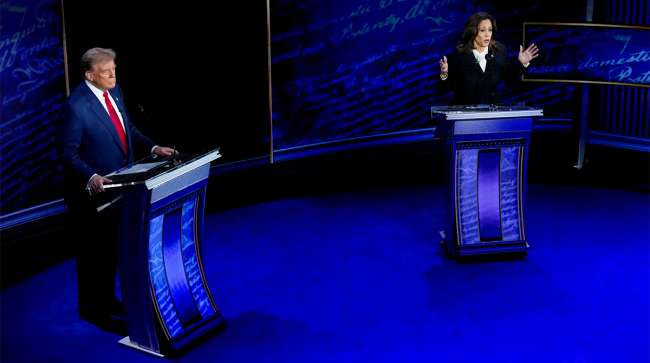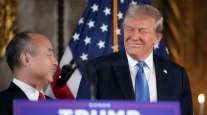Senior Reporter
Presidential Candidates Emphasize Energy Policies

[Stay on top of transportation news: Get TTNews in your inbox.]
The two major presidential candidates outlined divergent viewpoints for the future of the nation’s energy sector during their first debate on Sept. 10, with strategies for clean energy advancements contrasted against continued fossil fuel development at the center of their differences.
Vice President Kamala Harris stressed that the Biden administration has during her tenure boosted employment and innovation through its efforts.
“We have created over 800,000 new manufacturing jobs while I have been vice president,” Harris said. “We have invested in clean energy to the point that we are opening up factories around the world.”
She also pointed to the central role she has played in advancing legislation such as the Inflation Reduction Act and the Infrastructure Investment and Jobs Act, bills that aimed to boost the economy while preserving existing energy production and addressing federal-level climate goals.
TT's Seth Clevenger and Mike Senatore dive into the details behind the 2024 Top 100 Private Carriers list. Tune in above or by going to RoadSigns.ttnews.com.
“The young people of America care deeply about this issue,” she said of climate change. “And I am proud that as vice president over the last four years, we have invested a trillion dollars in a clean-energy economy while we have also increased domestic gas production to historic levels. We know that we can actually deal with this issue.”
Former President Donald Trump during the debate pointed to his administration’s role in promoting domestic oil production — such as championing fracking operations in states such as Pennsylvania — and affirmed a commitment to promote the oil sector.
“I got the oil business going like nobody has ever done before,” he said. “If she won the election, the day after that election, they’ll go back to destroying our country and oil will be dead, fossil fuel will be dead. We’ll go back to windmills and we’ll go back to solar, where they need a whole desert to get some energy to come out.”
Trump went on to question the viability of the Biden White House’s domestic energy portfolio. As he put it, “They have destroyed our energy business.”
Throughout the campaign, Trump has criticized Democratic climate change policies and proposals, and has told supporters that if elected he would immediately dismiss certain rules and guidance associated with emerging vehicle technologies. His administration’s focus, Trump has explained, would prioritize traditionally powered vehicles.
Harris during the debate spotlighted myriad stakeholder calls seeking enhancements to severe-weather resilience pertaining to the nation’s infrastructure. Recent serious hurricanes and floods around the country have destroyed roads and bridges and disrupted transportation connectivity. In addition to the IRA, the White House is overseeing the implementation of 2021’s IIJA, a $1.2 trillion law dedicating $5 billion for the National Electric Vehicle Infrastructure program to deploy EV infrastructure nationwide.
Harris’ campaign website presents a forward-looking agenda that lacks in-depth policy directives. “As president, she will unite Americans to tackle the climate crisis as she builds on this historic work, advances environmental justice, protects public lands and public health, increases resilience to climate disasters, lowers household energy costs, creates millions of new jobs, and continues to hold polluters accountable to secure clean air and water for all,” it says.
Want more news? Listen to today's daily briefing above or go here for more info
While Trump has maintained that he has no connection to the effort, Harris during the debate cited a conservative-leaning policy proposal created by The Heritage Foundation that outlines several priorities that the group would like to see advance under a new Republican administration. Project 2025, as the effort is known, calls for a series of federal transportation policy updates, such as privatizing aspects of the Transportation Security Administration. The document also proposes a re-evaluation of emissions reduction programs specific to the freight sector and reinforcing long-lasting supply chains for small businesses.
Authoring the Project 2025 transportation section was Diana Furchtgott-Roth, director of the Center for Energy, Climate, and Environment, and the Herbert and Joyce Morgan fellow in energy and environmental policy at The Heritage Foundation. Previously, Furchtgott-Roth served as deputy assistant secretary for research and technology at the U.S. Department of Transportation.





